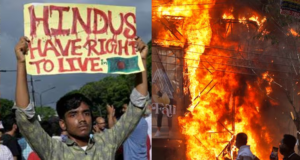 # Top officers resign, violence continues
# Top officers resign, violence continues
Dhaka: Bangladesh remains in a state of flux as the newly appointed interim government, led by Nobel laureate Muhammad Yunus, faces ongoing challenges. Despite Yunus’s call for peace and religious unity, reports of violence against minority communities persist.
Yunus, who was installed as the caretaker prime minister with military backing, visited Rangpur on Saturday, where he consoled the mother of a student killed in police violence. He has urged calm and unity, especially in light of recent attacks on minorities following the removal of former Prime Minister Sheikh Hasina.
The country is grappling with increased unrest, compounded by a series of high-profile resignations from key government positions. Abdur Rouf, the Governor of Bangladesh Bank, stepped down on Saturday after facing protests from over 100 bank officials demanding his resignation. Rouf cited health issues for his departure.
In a related development, Chief Justice Obaidul Hassan, a supporter of the ousted Hasina, was compelled to resign under pressure from students who surrounded the Supreme Court and gave him an ultimatum. This led to the resignation of five additional Supreme Court judges. President Mohammed Shahabuddin has appointed Justice Syed Refat Ahmed as the new Chief Justice.
Further adding to the turmoil, Professor Shibli Rubayat-Ul Islam, Chairman of the Bangladesh Securities and Exchange Commission, also resigned, citing health concerns after several days of absence from work.
Violence against minority communities, particularly Hindus, continues to escalate. In Chittagong, a large rally of Hindus was held on Saturday, demanding protection and equal rights. Reports of arson and clashes persist, including an incident in Gopalganj where five army personnel were injured and a military vehicle was set ablaze during a confrontation with an Awami League procession.
Since Sheikh Hasina’s resignation on August 5, Bangladesh has seen widespread violence across 52 districts, including arson, killings, and ongoing persecution of minority groups. The former Prime Minister fled the country the same day amid escalating protests, which followed the deaths of over 400 demonstrators in clashes with police. Hasina arrived in India later that day, seeking refuge after protesters stormed her residence.



